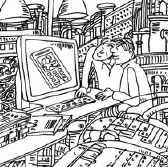
Seeing a business struggle and then fail is an agonizing experience. But unfortunately, as someone who has reported about the economic reform in the last three decades, I have seen too many companies fail, and too many brands disappear.
Not the so-called SOEs, or State-owned enterprises which have never learned to be enterprising. They have always been faced by problems in which their survival is at stake. But with depending on the government's bailout being their strategy, I have no doubt that they will be slow to learn, if not quick to die.
But sometimes, seemingly successful market-economy companies, like Kodak and Xerox, have also managed to get themselves to the point of almost falling into oblivion. And it is painful to see how some of them could have become like this after they had built considerable China operations and consumer reputation.
Right now, the world's few leading mobile handset builders may seem to be on the threshold of their failing success. At least as it is seen in China, that is. And if nothing is done to change the impression that they are no longer producing highly competitive new models.
The scenario for all once-successful international companies to die in China is similar. The executive team can be sent into such a rapture by the sales volume generated from the mass market that it starts to put less to reinvestment, especially the development of classy designs, fun features, and new functions.
And you know what I am talking about - the iPhone. But not necessarily it. I search at least once a week on the Internet for a replacement of my old Nokia, to allow me to not only send text messages, an indispensable function for the Chinese market, but also to log on the Internet and write and send emails easily and quickly. Following friends' advise, I have checked with the so-called business handsets in the high end of the market. There are also new brands, and products of the old brands do not necessarily get fewer negative comments from the users.
The same is true, it seems, of the few milk producers that are right now in unchallengeable control of the market. They keep putting out excellent milk products and waging excellent (and extravagant at times) marketing campaigns while medical scientists are saying, more and more often, that the cow milk may not be an excellent nourishment for the Chinese stomach as it is genetically programmed for most consumers. At least, to keep drinking more milk may not make sense, they say.
But what kind of nutrition can be better for Chinese consumers' daily intake, when they are anxiously waiting to find out - with fistful of new cash and a rising desire for healthy eating? We have had no clue yet.

China's mass market can be so large, and generate so intoxicating a sales volume year after year that companies can forget to think about other things to do when they are in perfect shape (and perfect cash position) to do them.
If some of them can be just a little creative as to do so, both their market share and the jobs they have created can be sustained.
The high-end market may be tiny in comparison with the demand from the low-end in a developing country. But it is by no means insignificant. It is not an elite sector that shares nothing with the rest of the market. It may point to the direction of the future.
Once a sectoral market has awakened to a new demand, it can pass its influence on to the rest of the economy. And no one can underestimate the effect of such a process in a rapidly developing society.
E-mail: younuo@chinadaily.com.cn
(China Daily 09/08/2008 page4)

